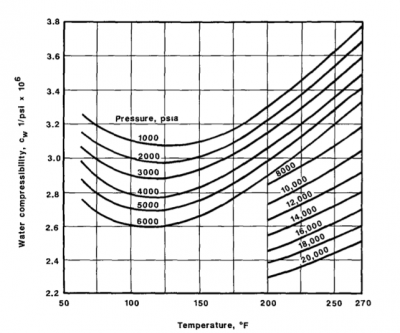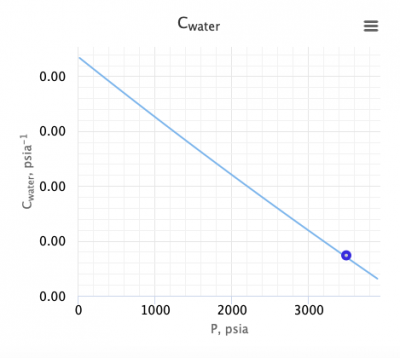Difference between revisions of "Water compressibility"
From wiki.pengtools.com
| (9 intermediate revisions by the same user not shown) | |||
| Line 15: | Line 15: | ||
== Discussion == | == Discussion == | ||
| − | We at pengtools.com are calculating water compressibility below the bubble point with the same equation at the moment. | + | We, at pengtools.com, are calculating water compressibility below the bubble point with the same equation at the moment. |
==Example. Calculating water isothermal compressibility== | ==Example. Calculating water isothermal compressibility== | ||
| + | [[File:Water compressibility.png|thumb|right|400px|Water compressibility correlation in the PVT software at pengtools.com]] | ||
Example source <ref name= M1990/> | Example source <ref name= M1990/> | ||
===Input data=== | ===Input data=== | ||
| − | :<math> | + | :<math> C_{mg/l} = 74289.3</math> |
Calculate water isothermal compressibility at 3500 psia and 165°F? | Calculate water isothermal compressibility at 3500 psia and 165°F? | ||
===Solution=== | ===Solution=== | ||
| − | :<math> \ | + | :<math> c_w = 2.6348E-6\ psia^{-1}</math> |
| − | : | + | |
| − | + | The solution is also available in the PVT software model at [The solution is available in the PVT calculator software model at [https://www.pengtools.com/pvtCalculator?paramsToken=d0f0c9c587152cefc27d1217e091ace0 www.pengtools.com] | |
== Nomenclature == | == Nomenclature == | ||
| − | :<math> | + | :<math> C_{mg/l} </math> = pressure correction, res bbl/STB |
| + | :<math> C_{mg/l} </math> = water salinity or solids concentration, mg/l | ||
:<math> P </math> = pressure, psia | :<math> P </math> = pressure, psia | ||
:<math> T </math> = Temperature, °F | :<math> T </math> = Temperature, °F | ||
| − | |||
| − | |||
==See also== | ==See also== | ||
| + | :[[Water bubble point pressure]]<BR/> | ||
| + | :[[Water compressibility]]<BR/> | ||
| + | :[[Water density]]<BR/> | ||
| + | :[[Water formation volume factor]]<BR/> | ||
| + | :[[Water salinity from density equation]]<BR/> | ||
:[[Water solids concentration]]<BR/> | :[[Water solids concentration]]<BR/> | ||
| − | + | :[[Water viscosity]]<BR/> | |
| + | :[[Gas/Water Interfacial Tension]] | ||
== References == | == References == | ||
<references> | <references> | ||
| Line 69: | Line 75: | ||
|titlemode= replace | |titlemode= replace | ||
|keywords=Water salinity, TDS, brine salinity, formation water salinity, Water compressibility | |keywords=Water salinity, TDS, brine salinity, formation water salinity, Water compressibility | ||
| − | |description= | + | |description=The formation water (brine) isothermal compressibility data is published in 1990 by McCain |
}} | }} | ||
[[Category:PVT]] | [[Category:PVT]] | ||
[[Category:pengtools]] | [[Category:pengtools]] | ||
Latest revision as of 08:15, 5 October 2020
Contents
Water compressibility
The formation water (brine) isothermal compressibility data is published in 1990 by McCain[1].

Water compressibility data [1]
Math and Physics
At pressures above bubble point:
Application range
The correlation is valid only for temperatures between 200 and 270F, pressures of 1000 to 20000 psia, and salinities up to 200000 mg/l[2].
Discussion
We, at pengtools.com, are calculating water compressibility below the bubble point with the same equation at the moment.
Example. Calculating water isothermal compressibility
Example source [1]
Input data
Calculate water isothermal compressibility at 3500 psia and 165°F?
Solution
The solution is also available in the PVT software model at [The solution is available in the PVT calculator software model at www.pengtools.com
Nomenclature
 = pressure correction, res bbl/STB
= pressure correction, res bbl/STB = water salinity or solids concentration, mg/l
= water salinity or solids concentration, mg/l = pressure, psia
= pressure, psia = Temperature, °F
= Temperature, °F
See also
- Water bubble point pressure
- Water compressibility
- Water density
- Water formation volume factor
- Water salinity from density equation
- Water solids concentration
- Water viscosity
- Gas/Water Interfacial Tension
References
- ↑ 1.0 1.1 1.2 McCain, W.D. Jr. (1990). Properties of Petroleum Fluids (2 ed.). Oklahoma: PennWell Corp. ISBN 978-0878143351.
- ↑ 2.0 2.1 McCain, W.D. Jr. (1991). "Reservoir-Fluid Property Correlations-State of the Art"
 . Society of Petroleum Engineers (SPE-18571-PA).
. Society of Petroleum Engineers (SPE-18571-PA).




